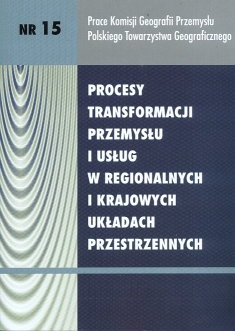Zmiany sieci hotelowej w aglomeracji krakowskiej po II wojnie światowej
DOI:
https://doi.org/10.24917/20801653.15.22Słowa kluczowe:
sieci, hotelowe, krakówAbstrakt
Hotel infrastructure belongs to the most important components of leading agglomerations economic base. It enables evolution of different types of tourist features, including business tourism. Cracow belongs to leading national centres and is treated as the cultural capital of the country. As seen this way, all its functions should be continuously developed for strengthening its position in European and world scale. An important premise in the realization of the above objectives is hotel base quality, its organization, management and price competitiveness.Changes of the economic system in Poland have created conditions for development of individual business, including tourism business. Progress of demonopolization and ownership transformations conditioned creation of private enterprises sector and privatization of state enterprises. Access to capital for private investors and its optimal utilization brought about emergence of independently operated hotel enterprises. Poland’s openness and integration with the EU structures evoked foreign investor interest. International brands appeared on the market, hotels in their structures used capital, know-how and modern tools brought by hotel business leaders.The present shape of Cracow agglomeration hotel network is the effect of many changes, equally of political, social, cultural and economic nature. The process, which has lasted for over 60 years, consisted of the post-war stagnation period, revival in the period of centrally planned economy (1970s and 80s), and dynamic development over the last two decades. The presented analysis shows that the most attractive location for hotel infrastructure is the old city centre, with concentration of 58 objects, representing nearly 50% of agglomeration and suburban area hotels. It shows the importance of development strategy for this type of infrastructure, which may influence the economic base of the city, individual districts, areas and households.Downloads
Metrics
Bibliografia
Adamczewski J, 1992, Kraków od A do Z, Krajowa Agencja Wydawnicza, Kraków
Altkorn J., 2001, Marketing w turystyce, PWN, Warszawa
Gaworecki W., 2007, Turystyka, PWE, Warszawa
Kuciński J., Trzciński Z., Zaborowski J., 2002, Podstawy prawne świadczenia usług turystycznych,
WSE, Warszawa
Kowalczyk A., 2001, Geografia turyzmu, PWN, Warszawa
Kowalczyk A., 2001, Geografia hotelarstwa, Wydawnictwo Uniwersytetu Łódzkiego, Łódź
Milewska M., Włodarczyk B., 2008, Hotelarstwo – podstawowe wiadomości, PWE, Warszawa
Raport o stanie miasta 2008, 2009, Urząd Miasta Krakowa, Wydział Strategii i Rozwoju Miasta, Kraków (dostępny na www.bip.kraków.pl)
Ruch turystyczny w Krakowie w 2008, 2008, raport końcowy – opracowany przez ekspertów Uniwersytetu Ekonomicznego w Krakowie, Akademii Wychowania Fizycznego w Krakowie, Wyższej Szkoły Turystyki i Ekologii w Suchej Beskidzkiej, kierownik projektu dr Krzysztof Borkowski, Małopolska Organizacja Turystyczna, Kraków (dostępny na www.mot.krakow.pl)
Turkowski M., 2003, Marketing usług hotelarskich, PWE, Warszawa
Witkowski Cz., 2003, Międzynarodowe systemy hotelowe w Polsce, Wyższa Szkoła Ekonomiczna, Warszawa
Pobrania
Opublikowane
Jak cytować
Numer
Dział
Licencja
Artykuły publikowane są zgodnie z warunkami licencji Creative Commons (CC BY-ND 4.0; uznanie autorstwa-bez utworów zależnych).

